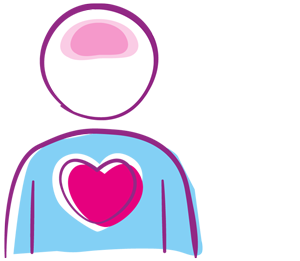Taking care of yourself
Last updated: 27/09/2021
Visit ‘My life and me’, our single parent wellbeing resource. It has advice, tips and links to other support.
Visit ‘My life and me’
Lots of parents tell us that they feel anxious and stressed, and that it’s hard to cope. It can be hard to put yourself first, or even think of yourself at all. But it’s good to care for yourself and it makes the job of caring for your children that bit easier.
There are things you can do to take care of your mind, your body and your time which are easy to do, free and don’t take a lot of time.
Your mind
Our minds can be pretty overloaded at times. If you ever feel like this, there are some ways you could settle your mind and get some breathing space.
- Mindfulness encourages you to be in the moment. It helps you manage your thoughts and calm your mind. You might get it from knitting, listening to music, colouring books or doing a jigsaw. There are many ways of practising mindfulness. The Mental Health Foundation has useful information about using mindfulness.
- Concentrate on being kind to yourself. This could mean standing in front of the mirror and telling yourself one good thing about yourself each day, writing down three things that have gone well for you today, or giving yourself a butterfly hug.
- Spending time in nature lowers stress, makes you feel happier, and makes your mind feel sharper. This could mean going for a walk or a cycle, enjoying the greenery of the local park or woods, taking in the view at a quiet beach, or sitting in the garden.
Your body
Lots of parents tell us that they feel tired and run down a lot of the time. When you’re low physically, it affects how you feel mentally. Taking steps to look after your body can make a big difference to your mood.
- Doing some exercise each week could make you feel a lot better. Walking the children to and from school, running up and down the stairs, dancing around the kitchen, or trying some of the NHS’s ideas on how to ‘get fit for free’ could all help to reduce stress.
- Eat well. There’s a big connection between what you eat and how you feel, and there are ways to eat well on a low budget. Try planning meals for the week, cooking from scratch, shopping when food is reduced and buying loose rather than pre-packed fruit and veg to save money.
- Sleep well. If you’re not sleeping well, try making your bedroom ‘sleep friendly’ by keeping it free from clutter, avoid screens before bedtime, and have a bedtime routine, including relaxing in the evenings. Sleep Scotland has resources to help everyone in the family get a good night’s sleep.
Your time
You may feel that there just aren’t enough hours in the day and that you become overwhelmed by everything that you have to do. But there is help available and things you can do to feel less stressed.
- Ask for help. Looking after children can be hard when you’re finding it hard to look after yourself. Parenting across Scotland has great tips on parenting children from babies to teenagers. You might also want to look into our local services for single parents.
- Setting yourself goals can be a good way of keeping yourself focused without becoming overwhelmed. Make your goals realistic, specific and short-term, or break longer-term goals into smaller chunks, so it feels more manageable. Try writing down your goals and celebrate when you achieve them.
- Relax. Taking time to do something fun or chill out can make you feel less stressed. This could be as simple as having a shower, listening to music, phoning a friend, watching something funny online or on TV. And remember, if there are things in your life that are causing you stress, it’s okay to say “no”.